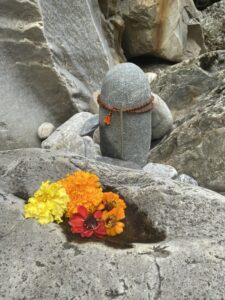Why do bad things happen to good people? To put it simply, they don’t. The reason for this is twofold. First, who is a good person and who is a bad person? In reality, each of us is such a mixed bag of personality traits and ego quirks that it is impossible to place our entire persona in a box and label it as ‘good’ or ‘bad.’ There’s enough good in the worst of us and bad in the best of us to make the wisest course to drop the judgement, labeling, and finger-pointing and to offer compassion towards all.
Second, our determination of what are ‘good’ or ‘bad’ events and circumstances in our lives is based on our own limited and frequently self-serving viewpoints. We call ‘good’ that which satisfies our desires and ‘bad’ that which thwarts our personal designs. To complicate matters further, our desires, and therefore the value systems with which we define good and bad, change over time. We have all had our satisfaction turn to lament shortly after getting what we were sure we wanted. Likewise, we have all had the experience of being deeply disappointed about a situation, only to later appreciate the good fortune that arose out of what we first saw as misfortune.
In the West, it is difficult to find the broad, non-dogmatic spiritual outlook necessary to understand the relative and subjective nature of what we call good and bad. That is why most of us lack any realistic spiritual context within which we can honestly understand the events of our lives. The Abrahamic religions postulate a powerful deity who rewards good behavior and punishes bad behavior, in this life or in the great beyond. But among and even within these religions there is no consensus on what constitutes good and bad behavior. In addition, history shows that religious standards change over time. If yesterday’s acceptable behavior were not today’s sin, a Christian could still return home from church to a lunch prepared by a human slave.
The yogic tradition is less concerned with social relativities, focusing instead on a universal ethic. Ethics in yoga is a practical framework of attitudes and behaviors which brings human beings into harmony with the entire universe, rather than a set of dictates handed down by a theological authority. This is why the yogic tradition considers nature such a grand teacher: She is uncompromisingly harmonious. When we live in accordance with nature’s rules, we prosper on every level. And what are these rules? Eat healthy food, exercise frequently, don’t sweat the small stuff, and love your neighbor as yourself. These are not complicated dictates but guidelines based on common sense that everyone, in his or her heart, already knows to be true.
In the search for peace, one comes to value all experience, good or bad, pleasant or unpleasant call it what you will as potential for growth. Although it might be hard to grasp while undergoing a painful experience, isn’t it true that growth often arises from difficulties? Since this is the case, perhaps we can become more enthusiastic about our troubles and see that they are the soil from which the bounty of life arises. It isn’t so much a question of figuring out if something is good or bad; it’s a matter of accepting our lives as they are and doing our best to respond with compassion, wisdom, and a sense of humor. It’s not so much a question of judging who is a good or bad person; it’s more a matter of recognizing the common spirit that runs through all of us.
Author and humanitarian Bo Lozoff has said that the reason most people are unhappy is that they live life in a superficial way, and life, by its very nature, is a deep and powerful mystery. Yoga practice is an art and science designed to bring about direct experience of the spiritual mystery of life. This often requires that we give up our habit of seeking easy, packaged answers. To advance in yoga practice, and to find real satisfaction in life, it is necessary to be somewhat of a maverick. We must learn to use our intuition and discover our own answers based on personal experience. It is only direct experience that will give us the confidence and freedom to delve deeply into the mystery and find out what lies in life’s depths.
We would do well to stop ruminating on dichotomies of good and bad, and to plunge into life with all its complexities and mind-boggling paradoxes. Christ talked about a “peace which surpasses understanding.” Go beyond trying to understand life it is not something to be understood. Life is something to be lived!
Helen Keller said, “Life is either a great adventure or it is nothing at all.” Great adventures are bound to include challenges, successes and failures, magnificent victories and giant blunders. When you let go of the need to define events as ‘good’ or ‘bad,’ you discover the profundity of all experience. When you release yourself and others from judgment and condemnation based on ‘good’ and ‘bad,’ you discover a spontaneity and security that seems miraculous.
Yoga is a path to a level of consciousness that lies beyond the flatland of hurry, worry, fear, and self-doubt. But getting here takes a leap of faith. So take a giant dive off the edge of the cliff of your personal security. The first few tries you might tumble to the ground but, if you keep trying, you’ll learn how to spread your own wings. You’ll fly on the winds of spiritual consciousness. You’ll tire of running on the treadmill of likes and dislikes, good and bad, judgements and moods. You’ll enjoy spending more time in yoga consciousness, satisfied with the two great gifts of yoga, shanti (peace) and shakti (vitality). You won’t be so concerned with analyzing which threads of experience are good and which are bad, because you’ll have the vision to see the entire tapestry of life in all its profundity, mystery, and grandeur.




